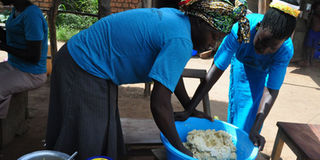Smart refugees add value to potatoes

Maridio, a refugee, kneads dough made out of orange-flesh sweet potatoes to make bread. PHOTO BY TOBBIAS JOLLY OWINY
What you need to know:
- Refugees in Adjumani earn a minimum of Shs300,000 monthly from potato value addition and lives are changing positively, writes Tobbias Jolly Owiny.
Whereas thousands of South Sudanese refugees settled in resettlement centres in Adjumani District live from hand to mouth or entirely depend on the food rations of the World Food Programme (WFP), the story is different at Ayilo and Mungula settlements.
Refugees at these facilities are taking advantage of the boom in orange-flesh sweet potato production in the settlements to add value and earn handsomely.
The unique potato variety was introduced at refugee settlements by Self Help Africa (SHA) under its Sustainable Livelihoods and Inclusive Markets for Refugees Project in mid 2018. At Lewa Trading Centre, Joyce Maridio, a refugee from Ayilo 1 settlement has established a stall where she makes chapatti and mandazi from the crop.
“I currently have an acre of these potatoes. Besides cooking them at home, I make bread three days a week and each time I make the bread, I get between Shs25,000 to Shs30,000,” she said.
The business has greatly supplemented Maridio’s income and improved her standard of living unlike before she attended value addition training by SHA in April.
Out of the enterprise she established in May 2019, she has been able to feed her family of six as well as educate her children.
“We don’t have to rely on the rations from WFP anymore because I can afford to buy good food for my family to supplement what we get from WFP monthly. I have been able to pay for my family’s medication since my husband does not stay with me.
The food
Adjumani District provided 3,128Sqkm of land on which 17 refugee settlement facilities are established to host a total of 202,433 refugees, according to the United Nations High Commission for Refugees (UNHCR).
Introducing the potato as one of the bio-fortified crops was meant to improve food security and nutrition to fight diseases such as anaemia in children, pregnant and breastfeeding mothers in the refugee settlement.
However, the production of the potatoes has gone beyond domestic consumption.
The process
To process doughnuts, the potatoes are boiled and pressed into a dough after it is cooled.
Baking flour and yeast are added to the dough to smoothen the texture and allow easy shaping in the case of making doughnuts.
Add salt, water, sugar colour to taste and lemon is later added to the mixture as a preservative before kneading.
The kneaded dough is then rolled and cut into sizeable pieces which are dipped and fried in cooking oil.
She says the only difference between the doughnuts and the pancakes is that yeast is not added to the mixture for pancakes whereas it is done for doughnuts.
“We have also been taught that the potatoes can be chipped and fried to make chips while one can also chip the fresh potatoes and dry them in the sun before frying in cooking oil to make potato crisps. I make these three times a week and each day I sell at least 70 pieces at Shs500 each. That is how many of us are making money,” she added.
Challenges
Nuwasasira pointed to challenges of prolonged rains and droughts which affect production cycles as well as limited land available to expand production gardens.
“We are working with more than 1,000 refugees at Mungula 1 and 2 refugee settlements, including Ayilo 1 and 2 to improve their agricultural production and income generation capacities through trainings on agronomy, post-harvest handling and value addition,” he added.
Seeds of Gold established that what used to be 50x50 square metres of land allocated to refugees, have now been reduced to only 30x30 square metres. But Welborne Kenyi, Pakele LC3 chairman says “I have been encouraging my host people to offer land to these refugees on a humanitarian basis.”
Adding value
John Francis Nuwasasira, the programme manager for Self Help Africa in Adjumani district said, “we are now propelling them into value addition so that they do not only consume it but add value to it and earn more money,” Nuwasasira said.
“If a piece of this mandazi sells at Shs500 and a single piece of potato can make four mandazi, that means they should make the mandazi from the potato and sell instead of selling it raw. This is the mathematics these refugees have now adopted in this case.”
According to Nuwasasira, adding value to the potatoes has become an important activity in the potato post-harvest chain of the refugees. “It has to be considered as a very important step in providing added income for these refugees who are too poor to provide meals for themselves and their families beyond the food rationed to them by World Food Programme.
Besides boiling and eating domestically, the refugees process the potatoes into several forms such as chips, doughnuts, pancakes and flour that is milled after sun drying.




